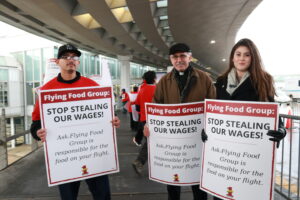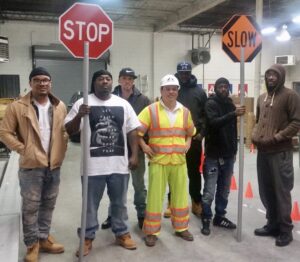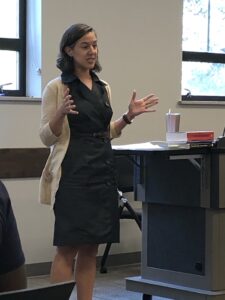The Working Catholic: Christmas Shopping
by Bill Droel
Will your shopping for gifts this holy season include buying apparel? Be warned: It will be difficult to find clean clothes. Some are hopelessly stained with child labor, even slavery. Most have flaws like sweatshop wages, dangerous working conditions, wage theft, harassment and more.
In recent years some consumers have shown interest in healthier food. The slow food movement has even reached the menus within the biggest fast food chains. Now a slow fashion movement is budding. For example, you can purchase clean jeans from Blue Delta in Oxford, Mississippi. There is an Ivy League educated woman in Tennessee who is doing well growing and selling indigo domestically. About 700 cotton farms in South Carolina practice re-shoring; that is, growing stateside and supplying manufacturers here. Even a few well-known apparel brands are gradually turning away from sweatshops.
It is likely too late to get into slow fashion purchasing before Wednesday, December 25, 2019. However, Advent (also called the Journey Outward) is an appropriate time for solid reading on the topic of clothing.
In Beaten Down, Worked Up (Alfred Knopf, 2019) Steven Greenhouse gives two thorough chapters to the history of U.S. apparel manufacturing.
In the early 1900s Triangle Shirtwaist Factory was a premier manufacturer of affordable women’s blouses. It occupied the top three floors of New York City’s Asch Building (now known as Brown Building and owned by N.Y. University). In November 1909 the women there and in other factories staged a strike. Aided by Women’s Trade Union League and by International Ladies Garment Worker Union and for a time by a few wealthy women called Mink Coat Brigade, the Triangle workers held out for over two months. Their demands were modest: Managers must stop “yelling at them, threatening them or harassing them” plus a change in the pay system–from a set amount per day, no matter the number of hours to an hourly wage. When they settled, the Triangle workers got a small raise and a 52-hour week. They did not get the first goal of every worker action: sole and exclusive bargaining rights. Nor was workplace safety part of the outcome.
Beaten Down, Worked Up profiles Clara Lemlich Shavelson (1886-1982). She was 23-years old in those last weeks of 1909. She emerged as a leader of the garment workers. At a crowded union meeting held in Cooper Union she pushed her way to the front and shouted: “I am tired of listening to speakers who talk in general terms. I move that we go on a general strike.” Her activism continued through her life. She pioneered the tactic of consumer boycott and started tenants’ groups in her neighborhood. In her 80s Lemlich Shavelson lived in a senior facility. Sure enough, she organized the nurses and aides. With these working conditions “you’d be crazy not to join a union,” she told the workers.
Beaten Down, Worked Up goes on to detail a devastating fire at Triangle Company that occurred in March 1911. After just 18 minutes, 144 people were dead.
Before 1900, it might be noted, there was no such thing as fashion in our country; except among the elites in Virginia and elsewhere along the Atlantic coast who took cues from Europe. There was no “off the rack” shopping for working women and men (only standard issue uniforms or homemade clothes). Only with mass production of apparel and other products in the 20th century could working-class people have an interest in and be able to afford fashion. The Triangle Company, like many other shops, cut and assembled stylish shirts; the beginning of what today is called fast fashion. Of course, the main ingredient in the early 1900s as with nearly all garments today was cheap labor. An exploitative wage system was and is justified.
Beaten Down, Worked Up then profiles a witness to the Triangle Company tragedy: Frances Perkins (1880-1965), an Episcopalian. She was in a nearby café, on break from her position with National Consumers League (www.nclnet.org). Her friend was Florence Kelley (1859-1932), a Quaker and the first general secretary of Consumers League.
If you have ever drawn overtime pay, ever collected an unemployment check, ever benefited from Social Security, ever been thankful for safety features at your job site, it is because of the tireless efforts of Perkins. After her time with the Consumers League, she worked for New York State and then became the first woman cabinet member, serving through all of President Franklin Roosevelt’s terms. She was compelled to improve conditions for working families by the imprint of the horrible Triangle Company tragedy.
How is it that all our clothes come from Asia or Latin America? Might President Donald Trump revive apparel manufacturing in the U.S.? Is there something we can do about dirty clothing even during these short days before Christmas? To be continued with information drawn from Fashionapolis by Dana Thomas (Penguin, 2019).
Droel edits a print newsletter of faith and work for National Center for the Laity (PO Box 291102, Chicago, IL 60629).



